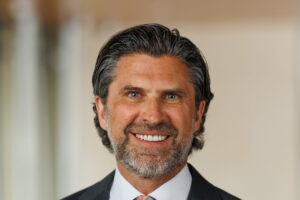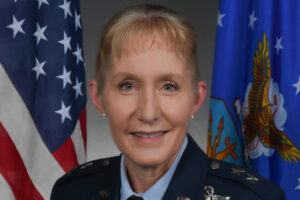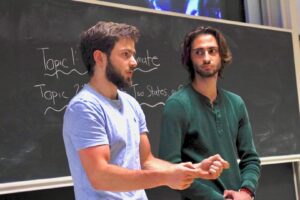AUSTIN, Texas—A $1 million gift from Jon and Rebecca Brumley to the Robert S. Strauss Center for International Security and Law at The University of Texas at Austin will create a chair dedicated to developing peaceful ways to ensure that technological and scientific advances do not endanger global security.
The Jon Brumley Chair in Global Affairs will explore a fundamental dilemma: Technology produces enormous benefits, but it also creates new dangers. Nuclear technology can be used to generate energy or to build bombs. Gene-splitting can used to produce life-saving drugs or to devise lethal biological weapons. The Jon Brumley Chair will fund programs that examine current and past efforts to reconcile technological advances with security needs, particularly the world’s struggle to contain the menace of nuclear proliferation. The chair will also support activities to examine future challenges created by advances in fields ranging from genetics to telecommunications to nanotechnology.
The Jon Brumley Chair will convene experts from a wide range of backgrounds and perspectives, including the business, technology and national security communities. The chair will also sponsor high-level conferences, underwrite high-impact research and bring top experts to campus.
"The spread of technology is one of the most important aspects of globalization," Strauss Center Director Dr. James M. Lindsay said. "But many technologies have a dark side. In the wrong hands they can wreak havoc.
"The Jon Brumley Chair in Global Affairs tackles a critical global challenge, and it will be a vital part of the Strauss Center. We thank Mr. and Mrs. Brumley for their generous gift to contribute to the debate on a subject that is so important to global peace and prosperity."
Jon Brumley earned a bachelor’s degree in business administration from The University of Texas at Austin in 1961. He has had a distinguished career in the energy business, having served in leadership positions of a number of companies. He is the chairman of Encore Acquisition Company in Fort Worth, Texas. Rebecca Brumley is also an alumnus of The University of Texas at Austin with a master’s degree in education. She is the chairwoman of Red Oak Foundation in Fort Worth, Texas. The Brumleys served on the appointed Texas State Board of Education as chair and vice chair from 1984 to 1988.
"The Strauss Center and the Brumley Chair give The University of Texas an opportunity to shine in the world arena, an arena where UT will be a leader in global thought and global peace," Jon Brumley said. "It is fun for us to share in the vision of Bob Strauss."
The first event sponsored by the Brumley Chair will take place on Tuesday, Nov. 20, at 5 p.m. in the Texas Union Governors’ Room, 3.116. Dr. Frank von Hippel, a former assistant director for national security in the White House Office of Science and Technology Policy, will speak on "Managing Nuclear Waste: The Illogic of Reprocessing." The talk will discuss how changes in the three-decade-old U.S. policy of banning the reprocessing of nuclear waste may unintentionally aid the proliferation of nuclear weapons.
Dr. von Hippel is professor of public and international affairs at Princeton University’s Woodrow Wilson School. During his time in the Office of Science and Technology Policy in 1993 and 1994, he played a major role in developing U.S.-Russian cooperative programs to increase the security of Russian nuclear-weapon materials.
The Robert S. Strauss Center for International Security and Law works to engage the best minds in academia, government and the private sector in developing practical solutions to the pressing problems of an increasingly globalized world.
For more information contact: Jill Angelo, 512-471-6267.



